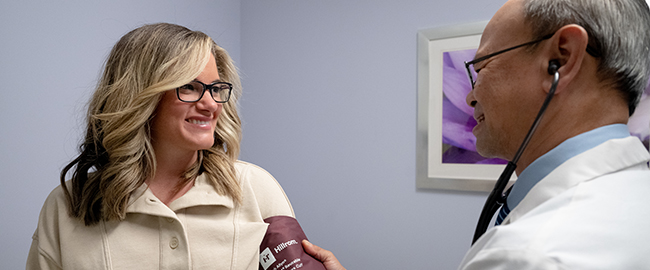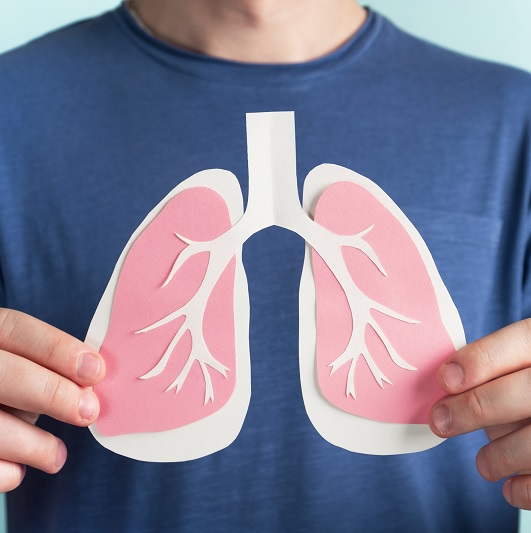Interventional Pulmonary Care in New Jersey
Interventional pulmonology focuses on diagnosing and treating lung and airway conditions using advanced, minimally invasive techniques. These procedures help avoid major surgery and support faster recovery – especially for people facing complex or hard-to-reach lung problems.
At Hackensack Meridian Health, interventional pulmonologists are specially trained to treat conditions affecting the airways, lungs, pleura (lining around the lungs) and lymph nodes in the chest. They work closely with other specialists to develop the right care plan for each patient.
Interventional Pulmonary Conditions We Treat
Our interventional pulmonologists care for people with a wide range of lung and airway conditions, including:
- Airway foreign bodies: Inhaled objects that block the airway and require removal
- Airway stenosis and obstruction: Narrowing or blockage of the airway that makes it difficult to breathe
- COPD and severe emphysema: Chronic lung conditions that limit airflow and may require advanced treatment
- Coughing up blood (hemoptysis): Bleeding in the airways or lungs that needs prompt evaluation and treatment
- Lung cancer and tumors: Abnormal growths in the lungs that may require diagnosis, staging and treatment planning
- Lung nodules: Small abnormal spots in the lungs that may be benign or cancerous and need further testing
- Pleural effusion: Buildup of fluid between the lungs and chest wall that can make breathing difficult
Interventional Pulmonary Procedures We Offer
Many interventional pulmonary procedures are performed through the mouth or nose using thin, flexible tools called bronchoscopes. These techniques are often safer and require less recovery time than traditional surgery. Common procedures include:
- Airway stenting and balloon dilation: Open narrowed airways to restore airflow
- Bronchoscopic lung volume reduction (endobronchial valves): A breakthrough procedure for severe emphysema
- Cryotherapy: Freezes abnormal tissue in the airway to remove or reduce it
- Endobronchial ultrasound (EBUS): For real-time imaging and lymph node staging
- Fiducial marker placement: Helps guide precise radiation therapy
- Medical pleuroscopy/thoracoscopy: A minimally invasive way to diagnose pleural disease
- Rigid bronchoscopy: For more complex airway cases or removal of large obstructions
- Robotic bronchoscopy: Advanced technology to precisely biopsy hard-to-reach lung nodules
- Thoracentesis and tunneled pleural catheter placement: Drains excess fluid to improve breathing
- Tumor ablation: Targets tumors directly inside the airway
- Whole lung lavage: A specialized washing procedure for certain rare lung diseases
Common Questions About Interventional Pulmonary Care
Finding out you have a lung nodule can be worrying, but it's important to know they are very common and most are not cancerous. Here are the most common next steps:
- Expert Evaluation: The first and most important step is to have your CT scan reviewed by a specialist. They will analyze the nodule's size, shape, and other characteristics to assess its risk.
- Personalized Plan: Based on the evaluation, we determine the right path for you. Many nodules simply require "watchful waiting" with a follow-up scan later on. Others might need:
- Advanced imaging (like a PET scan)
- A biopsy to get a tissue sample
- Surgical removal
3. Guidance and Support: You are not alone in this process. Our multidisciplinary team of experts in pulmonology and thoracic surgery will explain every option and guide you to the best decision for your health.
Contact our team to schedule a consultation or a second opinion.
You may be referred to an interventional pulmonologist if your care team needs a more detailed diagnosis or a procedure to manage your lung condition. These specialists are often involved when:
- A lung nodule or mass needs to be biopsied
- A blocked or narrowed airway needs to be opened
- You are being evaluated or staged for lung cancer
- You have recurring pleural effusions or need a long-term drainage solution
- You have severe emphysema and may benefit from minimally invasive treatment options
These experts can help determine the best path forward and avoid unnecessary testing or procedures. For more information, learn about the Interventional Pulmonary Program at Hackensack University Medical Center.







